The headline is my takeaway from the two an a half hour Committee of the Whole meeting of the McHenry County Board on next year’s budget and tax levy.
The Mental Health 708 Board property tax was $10.4 million.
Last year, the County Board did not cut its levy by that amount. (You can see from the figure below that the county’s tax levy was not cut by what I thought was promised.)
Under the Property Tax Cap, when a local government cuts its levy, it can reinstate the highest amount levied during the previous three years.
That is what Finance and Audit Committee Chairman Mike Skala put forth and gained tacit majority support for.
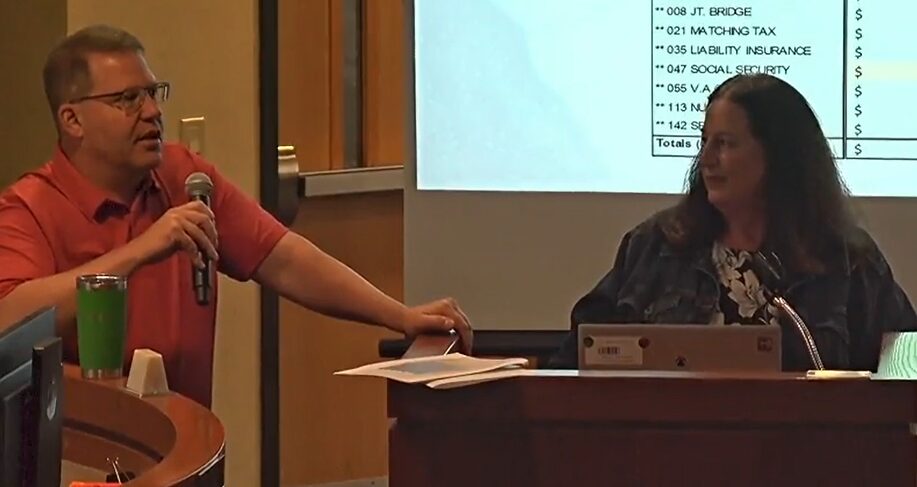
Mike Skala with microphone.with Finance Director Kerii Wisz.
The total real estate tax levies for the last three years follow:
- FY22 – $71,581,794
- FY23 – $73,802,726
- FY24 – $64,995,095
Using the word “flexibility,” proponents of higher taxes argued that inflationary pressure could not be met without the ability to levy higher property taxes in the future.
The extra cost to a homeowner, if the staff recommendation wer supported, will be $60.
Ironically, or, perhaps, deliberately, that is the same amount the average homeowner saved last year. (See link above.)
Throughout the discussion, Skala pressed for specific suggestions for budget reductions.
And, I’m sitting at home listening to the meeting wondering why no one pointed out that Governor Pritzker ordered a 4% state budget cut without offering specifics.
Why can’t the Board ask departments for details on a 3% cut without offering specifics?
Maybe that’s my first job as a Budget Examiner at the United States Bureau of the Budget (now the Officie of Management and Budget) coming out of me.
Leading the fight for taxpayers were these four Republicans;
- Terry Greeno
- Erick Hendricks
- Mick Shorten
- Matt Kunkle
Skala offered the sop a $1 million abatement after the new year, saying it could be more if additional cuts were identified.
The possibility of using about a half a million dollars of RTA sales tax money, (earmarked for transportation and/or law enforcement by state law) to purchase squad cars instead of real estate taxes was strongly opposed by Transportation Committee Chairman Jim Kearns.
He pointed out that the state legislature may rip the local RTA sales tax away to further finance more mass transit subsides and that both state and federal subsidies to replace bridges has ended
Joe Gottemoeller contended that a $1 million abatement would be insufficient. One point he made in support of a larger abatement was that repaying money borrowed from the Social Security (FICA) fund did not have to be all done in the next year.
When asked for ways they could reduce the need for property taxes, Clerk and Recorder Joe Tirio offered $242,000 from his automation fund to buy a new county computer, Circuit Clerk Katy Keefe reported automation in her office would reduce the need for three employees
The Sheriff, Record and Health Department offered up about five additional employees. (My notes on this are not precise.)
Additional cuts could be financed by drawing down the county’s balance from five months. (When I was County Treasurer I figured we needed three to four months revenue.)
Let me digress.
I’d like to offer an explanation of how my views evolved while I was State Representative in the 1970’s.
I was what you might characterize as a “responsible Republican” my first term. Then, Reagan supporter convince me that the only way to cut government spending was to cut government revenue.
I continue to hold that view.
Government will spend absolutely every dollar it collects.
And those in the bureaucracy have an easier job the more money they can obtain.
In his presentation, Skala contended that the County Board now has only “access to reductions.
“We’re actually spending $1.2 million below inflation.”
“It’s really all about the base,” John Collins accurately observed.
Skala advocated taking the Tax Cap-allowed 2.9% Consumer Price Index increase, plus new growth,and levying the highest amount in the last three years.
Without what was referred to as “the lookback,” Skala said next year’s budget would be $680,000 short.
One way to cut the budget would be to eliminate some employees. That would amount to saving $80,000 each.
So cutting payroll by 7-8 employees would about equal the $680,000 shortfall.
The alternative of levying the same amount as last year–a flat budget–was not one of the options he favored.
He said it would put the County in a $4 million hole by 2029.
It was pointed out that the capital plan was fully funded with the proceeds from housing Lake County prisoners in the McHenry County Jail paying the cost.
The logic for not using the Lake County payments for operating expenses, rather one-time capital projects, is that they could disappear at any time.
Carolyn Campbell came down on the side of increasing the levy by 2.9%, plus adding new growht.
Speaking again Collins expressed support for the lookback approach with an abatement.
Terri Greeno asked by the no CPI growth with a 3% cut had not been presented.
Skala evaded the question by pointing out that he has asked members for specific curs, all of which had been included on the handout.
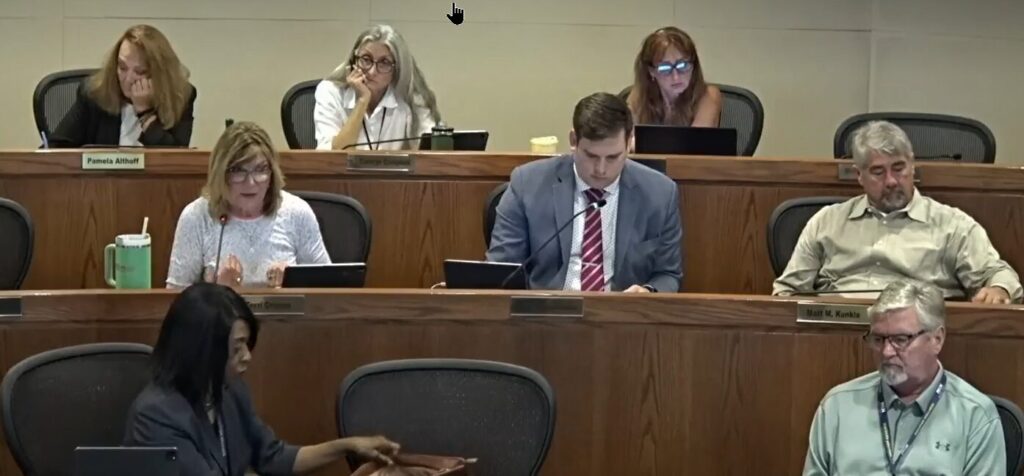
Terri Green speaking.
Greeno pressed on, saying she was looking for what would have to be cut for
- a 3% cut
- no CPI capture
- no capture of new growth
(Such a budget would actually decrease every taxpayer’s bill because the same amount of money would be spread over a larger assessment base.)
“The approach being advocated by Skala ‘is actually a continuation of the last two years.” she said.
“”We can’t do the department heads job.”
A $5 million increase in the tax levy was Skala’s position.
Finance Director Kerri Wisz said the average homeowner would see a $60 property tax hike under this plan.
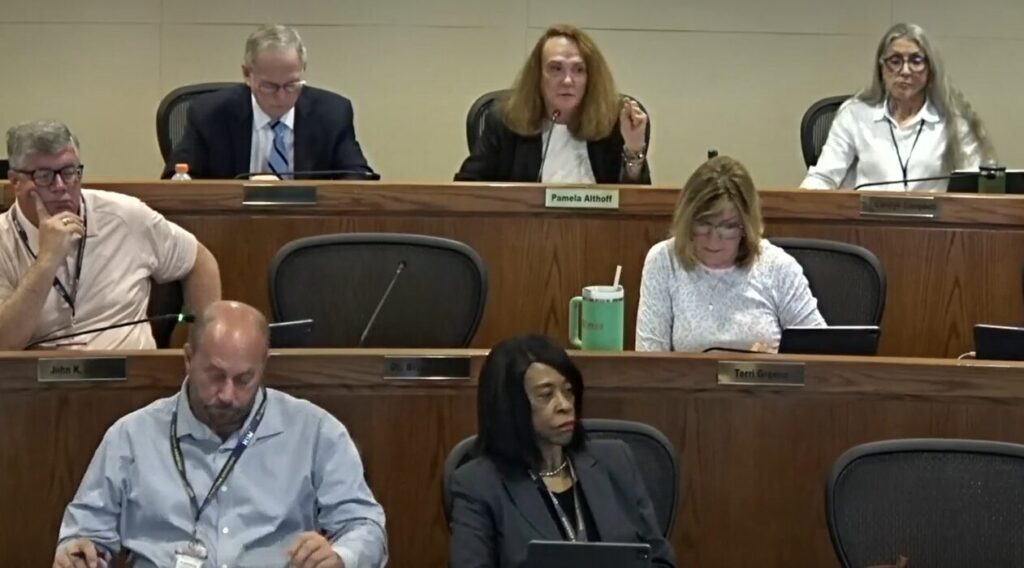
Pam Althoff speaking.
Pam Althoff reiterated Skala’s point that all reductions suggested by members had been worked into the work sheets.
She urged her colleagues not to follow the example of Springfield and “balance this year and worry about next year next year, kicking the can down the road.”
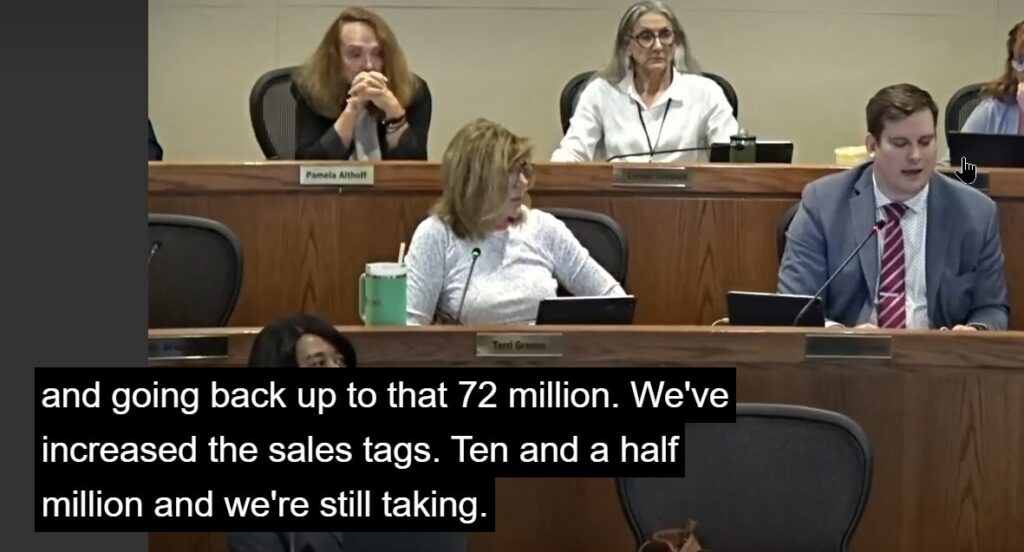
Erick Hendricks points out the lookback proposal would reinstate all the mental health levy shifted to a sales tax through voter referendum passage.
Eric Hendricks listed recent county tax increases:
- Motor Fuel Tax
- offshoring the Mental Health Board tax, promising a $10.5 million real estate tax reduction (which was not made)
“There’s literally no reduction [from eliminating the Mental Health levy].
“And here we are with the lookback.
“We’re always looking at the worst case scenario.
“Eleven percent increase? I’m totally against it.”
Hendricks said he had no problem using the RTA dollars for purposes other than transportation.
Mike Shorten listed the percentage of tax increases of local tax districts (which I have requested).
His bill for the county decreased 2.97%.
Kearns argued any cuts to the levy have to be “sustainable.”
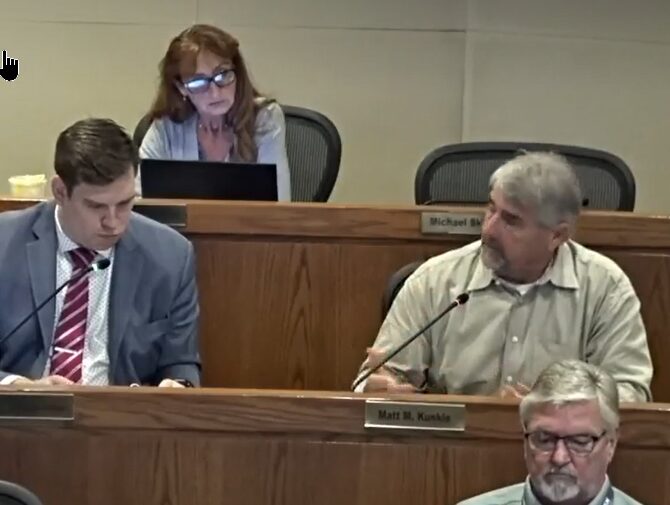
Matt Kunkle speaking.
Matt Kunkle said “I’m leading more toward Greeno’s view.”
He also agreed with Hendricks point concerning the Mental Health levy.
Concerning the lookback, he asserted, “That $1 million abatement is a joke A $3-4 million abatement is a jokee.
“The same inflation that affects our county affects our taxpayers.
“If we only had [a] $65 million levy what would we do?
Larry Smith indicated he would be “forced to take the lookback.”
Greeno commented about the $11 million saved from the Mental Health tax:
“We’re not taking that money back.”
Gloria Von Hof joined the other two Democrats in supporting the lookback approach.
“I am in favor of the 3-year lookback,” she said.
Shorten pointed to $100,000 that Diana Hartmann, Regional Superintendent of Schools said she could switch from the tax levy to a grant.
Greeno agreed with Hendricks that $600,000 in RTA sales tax could be use to buy the cars for the Sheriff.
Kearns asked what the levy would be using the lookback approach.
Admitting it was not in the handouts, Skala said it would be “just under $76.8 million.”
The, Kearns asked what a person’s tax increase would if the county took the CPI and new growth.
“$20,” the Finance Director replied, “$40 is your difference.”
Kearns argued biting the bullet “this year.”
Patrick Sullivan said he did not favor the lookback approach.
Tracie said she was “leaning toward the lookback.”
After the discussion, Skala concluded a majority were in favor of taking the lookback approach to raise the levy over this year’s slightly less that $65 million.

McHenry County Board Member Paul Thomas Extends His Tax Levy Comments - McHenry County Blog
[…] County Board Budget Meeting Leans Toward Recapturing Tax Levy Supposedly Given Up with Shift of Ment… […]
McHenry County Board Member Carl Kamienski Absolutely Against Reinstating the Ten Million in Real Estate Taxes Eliminated by Shifting Mental Health Financing to Sales Tax - McHenry County Blog
[…] County Board Budget Meeting Leans Toward Recapturing Tax Levy Supposedly Given Up with Shift of Ment… […]
We The People, McHenry County, Urges Contact with County Board Members to Remind Them of the Promise to Cut Property Tax Levy in Exchange for Voting for Mental Health Sales Tax - McHenry County Blog
[…] County Board Budget Meeting Leans Toward Recapturing Tax Levy Supposedly Given Up with Shift of Ment… McHenry County Board Member Carl Kamienski Absolutely Against Reinstating the Ten Million in Real Estate Taxes Eliminated by Shifting Mental Health Financing to Sales Tax Republican Party Executive Committee Calls on Republican-Dominated County Board Not to Raise Property Taxes, To Fulfill Last Year’s Promise to Cut Taxes Previous Post Good Thing I Wasn’t in Pennsylvania in 1955 […]
County Issues Press Release on Proposed Tax Levy & Budget (with Related Articles) - McHenry County Blog
[…] County Board Budget Meeting Leans Toward Recapturing Tax Levy Supposedly Given Up with Shift of Ment… […]
Resident Calls Out McHenry County Board for Proposing 13% Higher Tax Levy - McHenry County Blog
[…] County Board Budget Meeting Leans Toward Recapturing Tax Levy Supposedly Given Up with Shift of Ment… […]
Johnsburg’s Kirk Donald Pleads with County Board Not to Hike Taxes - McHenry County Blog
[…] County Board Budget Meeting Leans Toward Recapturing Tax Levy Supposedly Given Up with Shift of Ment… […]